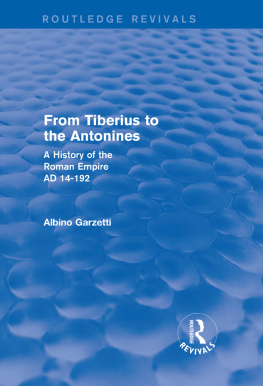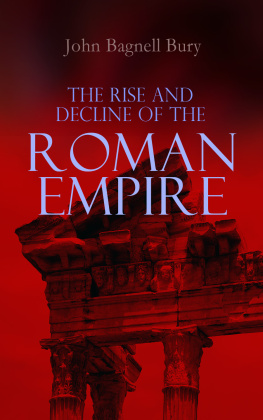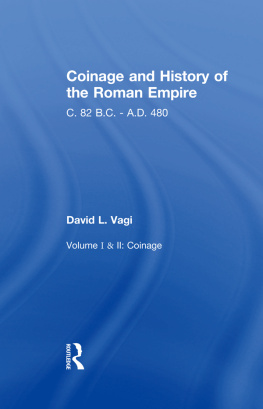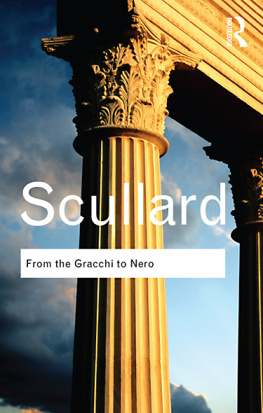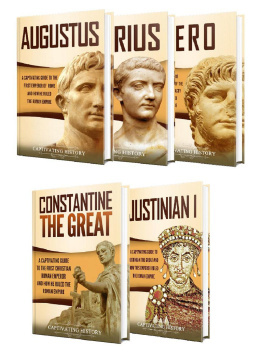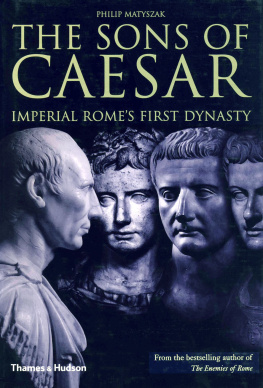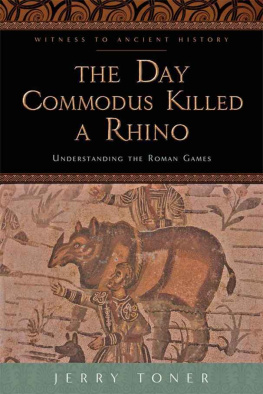Routledge Revivals
From Tiberius to the Antonines
The first two centuries of the Christian era were largely a period of consolidation for the Roman Empire. However, the history of the heyday of Roman imperium is far from dull, for Augustus successors ranged from capable administrators Tiberius, Claudius and Hadrian to near-madmen like Caligula and the amateur gladiator Commodus, who might have wrecked the system but for its inherent strength.
Albino Garzettis classic From Tiberius to the Antonines, first published in 1960, presents a definitive account of this fascinating period, which combines a clear and readable narrative with a thorough discussion of the methodological problems and primary sources. Regarding difficult historical questions, it can be relied upon for careful and reasonable judgments based on a full mastery of an immense amount of material. Nearly three hundred pages of critical notes and a comprehensive bibliography complement the text, ensuring its continuing relevance for all students of Roman history.
First published in 1974
by Methuen & Co Ltd
This edition first published in 2014 by Routledge
2 Park Square, Milton Park, Abingdon, Oxon, OX14 4RN
and by Routledge
711 Third Avenue, New York, NY 10017
Routledge is an imprint of the Taylor & Francis Group, an informa business
1974 Methuen & Co Ltd.
The right of Albino Garzetti to be identifi ed as author of this work has been asserted by him in accordance with sections 77 and 78 of the Copyright, Designs and Patents Act 1988.
All rights reserved. No part of this book may be reprinted or reproduced or utilised in any form or by any electronic, mechanical, or other means, now known or hereafter invented, including photocopying and recording, or in any information storage or retrieval system, without permission in writing from the publishers.
Publishers Note
The publisher has gone to great lengths to ensure the quality of this reprint but points out that some imperfections in the original copies may be apparent.
Disclaimer
The publisher has made every effort to trace copyright holders and welcomes correspondence from those they have been unable to contact.
A Library of Congress record exists under LC control number: 74170753
ISBN 13: 978-1-138-01920-1 (hbk)
ISBN 13: 978-1-315-77909-6 (ebk)
Additional materials are available on the companion website at
http://www.routledge.com/books/series/Routledge_Revivals
First published in 1960 as
LImpero da Tiberio agli Antonini
by Istituto di Studi Romani, Rome
1960 Istituto di Studi Romani, Rome
This English translation, including authors revisions and additions, first published in 1974 .
by Methuen & Co Ltd, 11 New Fetter Lane, London EC4P 4EE
First published as a University Paperback in 19761974 Methuen & Co Ltd
Printed in Great Britain by Butler & Tanner Ltdt Frome and London
ISBN 0 416 16800 0 (hardback edition)
ISBN 0 416 70480 8 (paperback edition)
This title is available in both hardback and paperback editions. The paperback edition is sold subject to the condition that it shall not, by way of trade or otherwise, be lent, resold, hired out or otherwise circulated without the publishers prior consent in any form of binding or cover other than that in which it is published and without a similar condition including this condition being imposed on the subsequent purchaser.
Distributed in the USA by
HARPER & ROW PUBLISHERS, INC.
BARNES & NOBLE IMPORT DIVISION
CONTENTS
Map: The Roman Empire circa A.D. 68
I should like to thank Dr R. P. Duncan-Jones of Gonville and Caius College, Cambridge, Mr R. W. Howorth, my colleague at the Civil Service Commission, and Mrs Gillian Wright of Methuens editorial staff for many felicitous suggestions. I alone am responsible for the deficiencies that remain.
In the difficult matter of names, I have elected to use the anglicized forms those likely to be the most familiar to the majority of English readers but I doubt if I have been absolutely consistent. In any inconsistencies that I have overlooked and indeed also for inadequacies in the translation as a whole I beg the readers and, of course, Professor Garzettis indulgence.
J.R.F.
March 1973
THE
JULIO-CLAUDIAN
DYNASTY
The death of Augustus, after forty-five years of personal power and fifty-seven years from the day when he had accepted the legacy of Caesar, was not to pose any problem of succession from a practical point of view. The care he had taken during his lifetime, right from the earliest days of his principate, to put a member of his family constantly in the limelight, with the clear implication that this person was marked out to succeed him, shows how he himself regarded it as natural both that the system he had founded should continue notwithstanding the provisional character with which he deliberately endowed it by clothing it in legal fictions and in particular that the principate should remain in his own family. Moreover, it must have appeared natural to the Senate and people of Rome, to Italy and to the provinces. After almost half a century of the new rgime, the mere fact that people were now accustomed to it was sufficient to remove it from the realm of discussion, if only because it was a lesser evil than the troubled conditions prevailing previously. If we add to this the advantages of a peaceful life in an order of things in which the prestige and personal tact of Augustus had managed to overcome mistrust and satisfy sensibilities, it is easy to see why a solid base of universal consent henceforth sustained the Augustan principate, even in its evolution towards the revelation of its own true nature, that of an ever more clearly marked despotism. That the rgime should revert to a struggle between factions, thus renouncing the very element which had finally reduced the latter to silence, was quite unthinkable and far from anyones wish. We must not fall into the error of introducing into this context of facts and judgements the concept of freedom as we understand it today. Cicero (De Rep., II, 43) had said, it is true, that a people which is under a king lacks many things, in primis freedom, which does not consist in being under a just lord, but in being under no lord at all: but in Ciceros eyes Augustus would not have ranked as a king. In the political atmosphere officially promoted by Augustus, with its resurrection of republicanism and rehabilitation of Pompey, Catos freedom could be commemorated and honoured with impunity by anyone who wished to do so. The great families who now made their influence felt in the state by serving the monarchy, as they had made it felt before with bigger risks in the framework of the oligarchy, were not going to exchange the certainty of present dignity for the uncertain return to a situation which would have only been the starting-point of a new struggle for supremacy. As for the population of Rome and the empire as a whole, the problem did not even arise. The principate was henceforth firmly established, both in form and substance, as the product of the long process of development which had led it, under the shrewd and attentive eye of its founder, from the original usurpation of power to a de facto legitimacy founded in the unanimous view of all on the superhuman primacy of the auctoritas, and to the de jure legitimacy of the restoration of the republic. But apart from its constitutional characteristics the structure built up by Augustus was made to last because, realistically, its architect had seen it as an essentially administrative structure. The remote but fundamental cause of the Roman revolution, at any rate from the period of the great Mediterranean conquests onward, had been the inadequacy of the government of the city-state when confronted with the demands of a world empire. Hence the republics evolution governed by the needs that arose on the way, guided by the typically Roman law of empiricism and checked by the powerful rein of tradition into the principate and the rgime of Augustus, who, with his genius for practical organization, utilizing all the preceding experiences and devoting to the business of government a constant personal attention which to us seems wonderful and is in fact the principal aspect of his greatness, completed and concluded the long process after his final victory in the Civil War.

